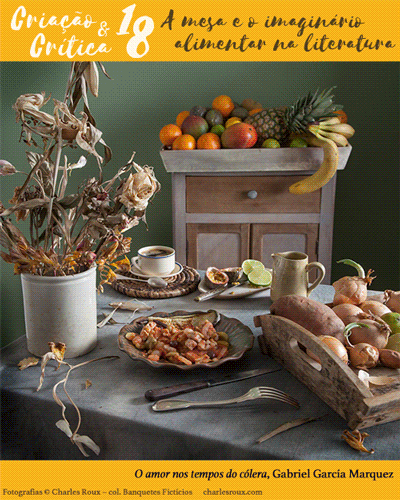LITERATURE AND EATING IN JOSÉ DE ALENCAR
DOI:
https://doi.org/10.11606/issn.1984-1124.v0i18p152-169Keywords:
Literary device, Fictional character, Gastronomy in literature, Meal scene, ConvivialityAbstract
Under the assumption that a romantic fictional character is made from a real person model, recognizing the literary aspects employed by the novelist on the constitution of the plot seems to be pertinent for the reception of one’s work. In this regard, eating could be considered a valuable expression on the framing of spaces that invite the conviviality for fictional conflicts, as well as an interesting figure to characterize places and characters. From a chosen corpus of José de Alencar, this paper will establish parallels with French gastronomy studies, proposed by Brillat-Savarin and by Balzac, and also utilize literary critic concepts, introduced by E. M. Forster and Antonio Candido, to build up and explore scenes of meals, eating and gastronomic aspects used by the novelist for composing his works. The focus will be on the study of extracts selected from his works where eating and ingredients appear as central elements in the fictional composing, but also in the inspection of how these elements could be part of the local color in the literary project of Alencar.Downloads
References
ALENCAR, José de. Ao correr da pena. São Paulo: Tipografia Alemã, 1874.
ALENCAR, José de. Como e porque sou romancista. Rio de Janeiro: G. Leuzinger e filhos, 1893.
ALENCAR, José de. O Guarani. Rio de Janeiro: Empresa Nacional do Diário, 1857.
ALENCAR, José de. Iracema. São Paulo: Hedra, 2006.
ALENCAR, José de. Lucíola. São Paulo: Ática, 1992.
ALENCAR, José de. Senhora. São Paulo: O Globo, 1997.
ALENCAR, José de. “Benção paterna”, in: Sonhos d’Ouro. São Paulo: Melhoramentos, 19.
ALENCAR, José de. O sertanejo. Rio de Janeiro: B. L. Garnier, 1875.
ALENCAR, José de. O tronco de ipê. São Paulo: Martin Claret, 2006.
BALZAC, Honoré. de. Traité des excitants modernes. In: BRILLATSAVARIN, J. A. Physiologie du goût. Paris: Charpentier LibrarieÉditeur, 1839.
BRILLATSAVARIN, J. A. Physiologie du goût. Paris: Charpentier LibrarieÉditeur, 1839.
BROCA, J. Brito. Românticos, Préromânticos, Ultraromânticos: vida literária e romantismo brasileiro. São Paulo: Polis, 1979.
CANDIDO, Antonio. “Os três Alencares”. In: Formação da Literatura Brasileira – momentos decisivos 1750 – 1880. São Paulo: FAPESP, 2009.
CANDIDO, Antonio. Personagem de ficção. São Paulo: Perspectiva, 1968.
FORSTER, E. M. Aspectos do romance. Porto Alegre: Globo, 1969.
FRANCO, Ariovaldo. De caçador à gourmet. São Paulo: Senac, 2001.
FREYRE, Gilberto. Casagrande e senzala: formação da família brasileira sob o regime da economia patriarcal. 49 ed. São Paulo: Global, 2004.
PINTO, M. C. M. Alencar e a França: perfis. São Paulo: Annablume, 1999.
PINTO, M. C. M. A vida selvagem: paralelo entre Chateaubriand e Alencar. São Paulo: Annablume,1995.
Downloads
Published
Issue
Section
License
Authors who publish with this journal agree to the following terms:
- Authors retain copyright and grant the journal right of first publication with the work simultaneously licensed under a Creative Commons Attribution License that allows others to share the work with an acknowledgment of the work's authorship and initial publication in this journal.
- Authors can enter into separate, additional contractual arrangements for the non-exclusive distribution of the journal's published version of the work (e.g., post it to an institutional repository or publish it in a book), with an acknowledgment of its initial publication in this journal.
- Authors are permitted and encouraged to post their work online (e.g., in institutional repositories or on their website) before and during the submission process, as it can lead to productive exchanges, as well as earlier and greater citation of published work (See The Effect of Open Access).



